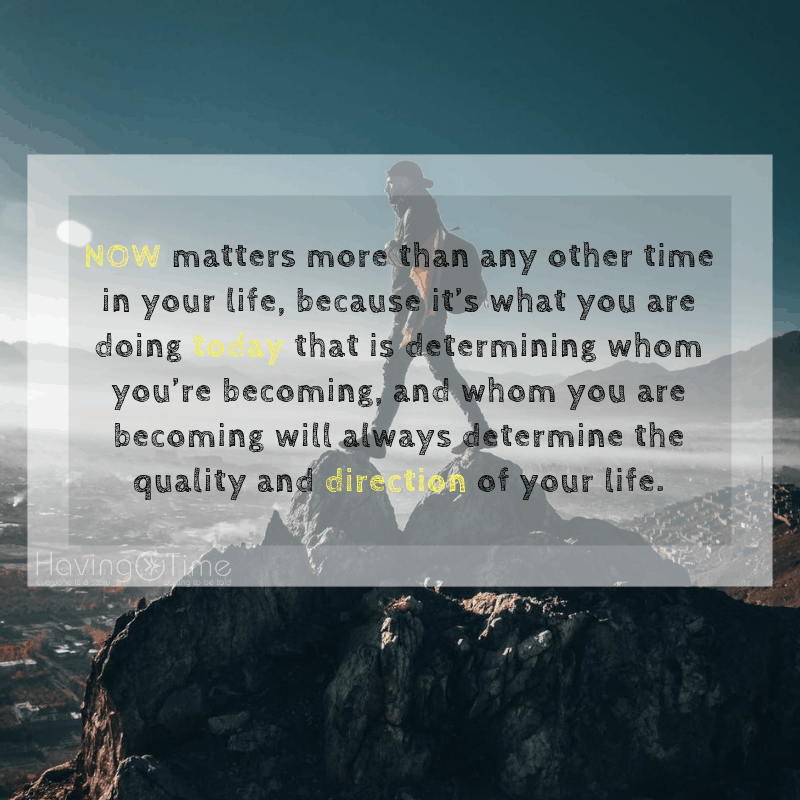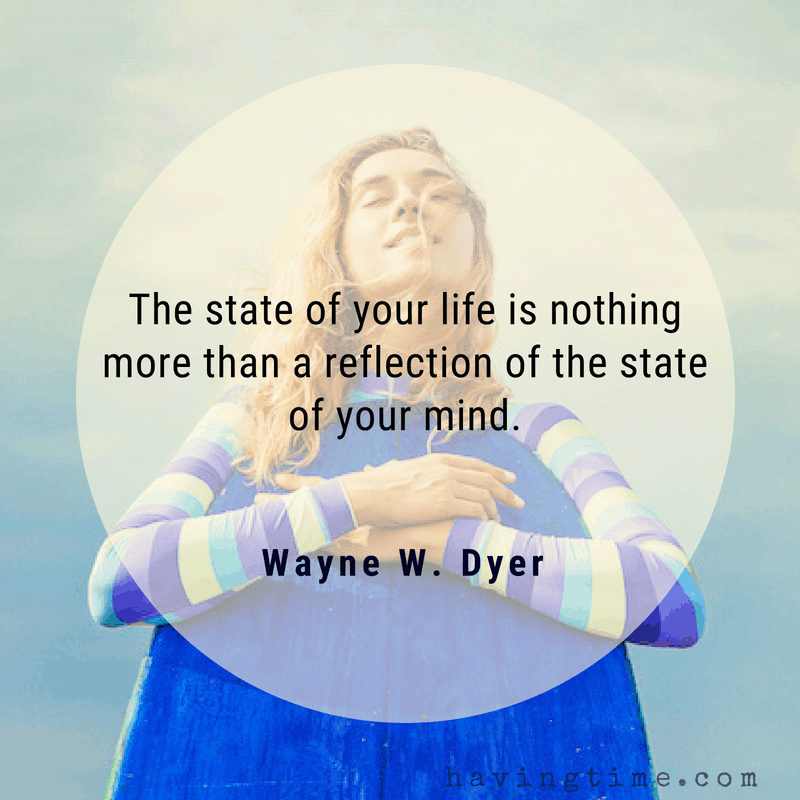Why do we get stuck and unhappy in life? The ability to quiet a busy mind isn’t as impossible as most people think. However, we tend to believe that this is just ‘the way we are’ and feel stuck living our lives with a constant stream of thought, one after another, after another. We don’t consider there is a better, less stressful and more peaceful way to live. But there is.

Why Do People Stay Stuck & Others Change Their Lives?
There is a way to quiet our busy minds which I know from personal experience.
I don’t just have a busy mind but suffer from a generalized anxiety disorder.
I worry about everything and anything.
If I am going to meet a friend for drinks, I worry about what drink I should order. Wine? Might make me sleepy. Beer? Might make me feel bloated. Gin & Tonic? Usually a safe bet but will they have my favorite- Hendricks?
When I am going on a vacation trip, I worry about what I’ll wear to the airport and then what I’ll need to pack for each of the days I’m away. Usually, airports are warm, but then sometimes the plane is cold. I worry about how to layer my clothes while still looking fashionable.
I paid a small fortune for second-row seats to see Dancing With The Stars with my daughters. I worried about: getting there on time, finding a close parking space, the smoke-filled casino we have to walk through, finding the nearest entrance to the stadium, someone tall sitting in front of us blocking our expensive view, getting hungry in the middle of the show and having to wait until intermission, being too hot or too cold, not having comfortable enough shoes on.
And those are the fun situations that I worry about! Imagine how much I worry when I hear that my job is changing, a family member is ill, I receive a message from a manager saying he needs to speak with me or a close friend never texts me back.

Because of my inclination to worry, I have read a lot of personal development books. Mostly I get my books from the library. Sometimes I’ll see a particularly interesting book at a bookstore and splurge paying full price. Some personal development books I read cover to cover. Some I don’t read past the first chapter because they are boring. The favorites I always read with a highlighter, then listen to the audio as well.
I read about 20 personal development books a year. My favorites are always those that focus on how our thoughts impact our lives. Which is why, after decades of reading personal development books, the book, I still recommend the most to others is, The Power of Now by Eckhart Tolle which has helped me tremendously.
Many mornings I sit at my desk in my home office and re-read sections of The Power of Now. On those particular mornings, I find I am more present, less caught up in my anxious thoughts, and better equipped to handle big and little stressors of daily life.
The message of The Power of Now is simple. We are all very much identified with our minds. We have a constant running inner-dialogue with ourselves. This keeps us in our minds and out of the present moment. When we become aware of this pattern and begin to notice the constant stream of thoughts, we create space which allows us to become less attached to those thoughts.
There are no problems in the present moment. Even if something awful is happening at the moment, there is no worrying about it; there is just taking action or watching it unfold.

The worst thing that has ever happened to me was when I watched my daughter had a grand mal seizure at the Yale Children’s Hospital when she was four years old. She was seizing, and the doctors were scrambling because the machines they needed in the room weren’t hooked up properly.
I’ve never felt more helpless in my entire life! I just stood in the corner of the room and watched; there wasn’t anything I could do.
The present moment will always happen; we don’t need to think about it or plan for it. We can’t.
If we get our hopes up thinking about the future and the situation doesn’t meet our expectations, we are disappointed. If we are spending time worrying about something happening in the future and it doesn’t go as badly as we thought it would, we’ve wasted our time worrying.
However, most of the time, the constant chatter in our heads is utterly meaningless. The thoughts might sound like: it’s so cold in here, those people need to take down their Christmas wreath, I wonder what we’ll have for dinner, etc.
When we live unknowingly attached to the thoughts in our mind, we live in default and at the mercy of whatever thought/s might flow into our consciousness.
Michael Singer author of The Untethered Soul and The Surrender Experiment gives an example of this that I have always loved. Imagine it’s your wedding day. You are in the car on the way to your wedding that you have been dreaming of for years. All of a sudden, you have the thought, “Do I love him?”
When we are identified with the mind, a random thought like this can turn our world upside down!
It doesn’t have to be as drastic as this example. It could be a Monday morning as you are heading into work, and you have the thought, “I can’t stand these idiots I work with.”
We come home from work and have the thought, “Why am I the only one in this house who puts things away?”
In each of these scenarios, we are living in default of whatever thought happens to come into our mind. Most of us are unaware of how identified with our minds we are.

We don’t notice the thoughts; we just get caught up in a dialogue with ourselves. We have little to no realization of how dependent our mood and well-being is on our fleeting thoughts.
There are two strategies to stop living on autopilot.
Decide how you want to feel, then choose thoughts to support that feeling
The first thing to do is to decide how you want to feel, then choose thoughts that support that feeling. This is basically what affirmations are, but SNL spoiled the benefit of affirmations for most people. We need to do this before the situation occurs.
If we want to start our work week in a positive and upbeat mode, we need to pick phrases that will help us get there.
“I’m looking forward to catching up with Sally today at lunch.”
“I’m happy that on-going project is finally over and I can start something fresh this week.”
If we want to be in a good mood when we come home from work, we can tell ourselves, “I’m excited to make a new recipe for dinner tonight and hear about the kids’ days at school.”
If you want to lose weight, “I’m going to stick to my healthy eating habits today and then look forward to keeping up with it tomorrow.”
Being proactive in this way is the opposite of living in default. You are living deliberately, and with intention.

Be hyper-focused on the present moment using your senses
The best way to do this is to use your senses. What works best for me is the sound.
When we are very focused on whatever sound we can hear, it’s impossible also to be caught up in our thoughts at the same time. In the shower, listen to the water running. When doing the dishes, listen to the sounds of the plates against the sink.
Imagine you are sitting outside on your porch.
Scenario #1. We notice the birds chirping, the green grass, the smell of spring air, and the warm sun our face. We are making a conscious effort to be more fully present in the current moment using all of our senses. Because we are so focused on the present moment, when the thought comes to us, “I wonder when we’ll have to start mowing the lawn?” We can quickly notice the thought, let it go, and return to the peace in our head.
Scenario #2. We are outside, but our head is still thinking about that to do list on the counter. We are wondering if it would be better to go to the store now or wait until later this afternoon. There could be a wild turkey five feet in front of us, but we’d hardly notice it because we aren’t there. When the thought comes to us, “I wonder when we’ll have to start mowing the lawn?” we make a mental note to add that to your to-do list and decide to head back inside and do it right now.
When using both of these strategies together, we will notice less and less stress in our life. The worry that seemed so keen on the past, is now only a passing thought we see and let go. Our conscious positive thoughts create an underlying feeling of peace and joy. That busy mind you thought you were stuck having will gradually become less and less busy as you become more present. This is the magic of creating space between our thoughts and our conscious minds.
photo source | pexels + giphy

